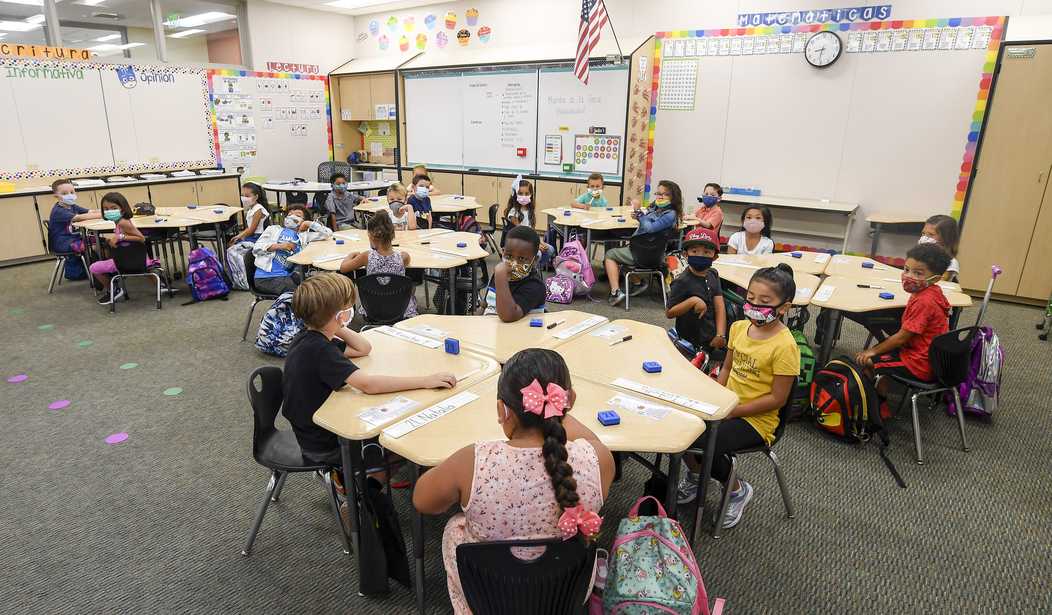The COVID-19 pandemic erased decades of academic progress and widened disparities in most states, according to test results released from The National Assessment of Educational Progress this week.
In math, the “steepest decline ever recorded” showed that math scores fell in nearly every state, according to The New York Times. Only 26 percent of eighth graders were recorded as “proficient” in math, down from 34 percent in 2019.
Forty-one states saw math scores decline for fourth graders. Only 36 percent of fourth graders were “proficient” in math, down from 41 percent:
In eighth-grade math, the average score fell in all but one state. Seventeen states and the District of Columbia experienced double-digit drops, including higher-performing states like Massachusetts and New Jersey, and lower-performing states like Oklahoma and New Mexico. Utah was the only state where the eighth-grade math declines were not deemed statistically significant.
Places like Delaware, Maryland and Washington, D.C., fell by double digits in both fourth- and eighth-grade math.
In reading, a “downward trend” that that pre-dated the pandemic was exacerbated in the last two years.
“No state showed sizable improvement in reading. And only about one in three students met proficiency standards, a designation that means students have demonstrated competency and are on track for future success,” The Times reported. Only 31 percent of eighth graders were proficient in reading.
For fourth graders, in both math and reading, students in the bottom 25th percentile “lost more ground” compared to their peers at the top of the class. This means that low-performing students are even farther behind.
Recommended
In a survey included in the test, only half of fourth graders who were low performing in math said they had access to a computer at all times during the 2020-21 school year, compared with 80 percent of high-performing students.
Similarly, 70 percent said they had a quiet place to work at least some of the time, compared with 90 percent for high performers.
The exam is administered by federal officials and is more rigorous than most state tests. It sampled 450,000 fourth and eighth graders in more than 10,000 schools.
“I want to be very clear: The results in today’s nation’s report card are appalling and unacceptable,” Secretary of Education Miguel Cardona said in a statement. “This is a moment of truth for education. How we respond to this will determine not only our recovery, but our nation’s standing in the world.”
In an interview with the Associated Press, Peggy Carr, the commissioner of the National Center for Education Statistics, said that the results are “a serious wakeup call for us all.”
Former North Carolina Gov. Beverly Perdue, chair of the National Assessment Governing Board, told Politico that “there are no winners. There are no losers. There are losses among all states and all grades.”
"These numbers prove that American parents’ concerns about their children’s education during the pandemic weren’t speculative – but in fact, perfectly valid,” Nicki Neily, the president of Parents Defending Education, told Townhall in a statement.
“American students were the subject of a years-long social experiment that will impact our country’s economy for decades to come. It’s time to hold the education bureaucrats, activists, and public health officials who mocked, shamed, and derided families accountable for their decisions – and refuse to cede them any further authority (or funds) going forward,” she added.
"This plunge in academic outcomes was predictable because people in positions of power allowed teachers unions and other fear mongering influencers to put children last. We knew prolonged school closures and masking would have catastrophic effects on children. And now we have more evidence that they did,” PDE Director of Outreach Erika Sanzi told Townhall.
Since the onset of the pandemic, students have had their education disrupted by lockdowns, virtual learning, and recently, teacher strikes. Townhall has covered how low academic performance, chronic absenteeism and mental health challenges have become prevalent among students as a result. A study from the U.S. Centers for Disease Control and Prevention found that more than 40 percent of teens felt “sad or hopeless” during the pandemic.

























Join the conversation as a VIP Member